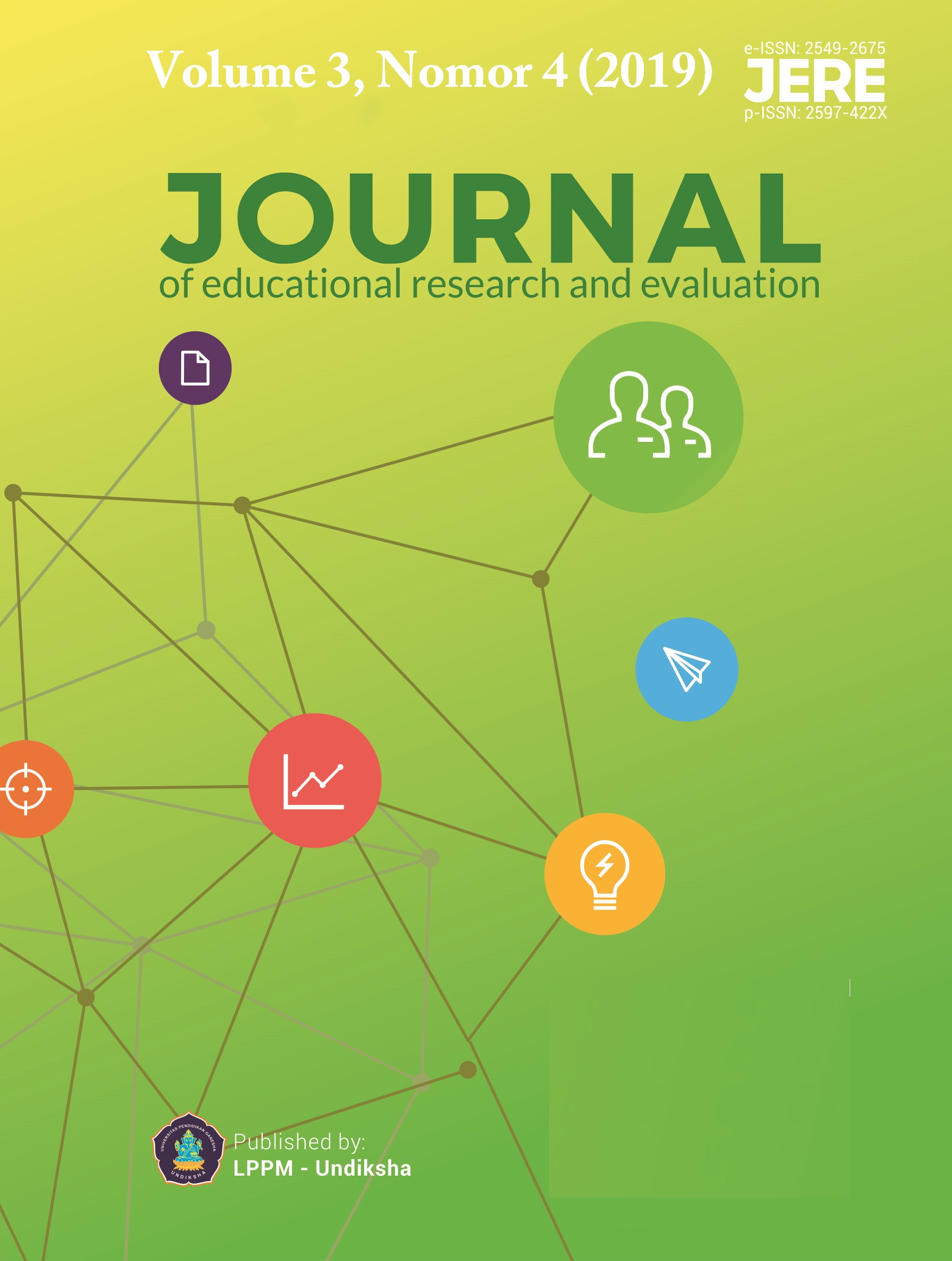Development of E-Learning Modules for Information Systems Studies Based on Balinese Local Wisdom
DOI:
https://doi.org/10.23887/jere.v3i4.22561Keywords:
E-Learning, Tourism Information System, Local Genius Bali, Learning ToolsAbstract
The learning process in college is not just reading material, doing assignments, collecting assignments, and then completing. If it is examined closely with the material presented it can be tedious and after the learning process does not increase students' knowledge. The most likely thing to do is to improve teaching material in an innovative direction that can improve graduate competency. So based on the 2016 curriculum, a Tourism Information System (TIS) course appears. Students who graduate need to be provided with knowledge about this TIS, especially because in Bali it is a world tourist destination.In realizing this, learning tools are needed to help, so a module is created to help the learning process that integrates SIP with the local culture of Bali to produce more attractive promotions that are accessed in E-learning.
References
Antara, 2014, Kearifan Lokal Bali Tri Hita Karana Diadopsi Dunia, diakses: 10/1/2019, https://www.wartaekonomi.co.id/read34454/kearifan-lokal-bali-tri-hita-karana-diadopsi-dunia.html
Balipost, 2017, Bali Harus Dikelola Dengan Konsep “Nyegara Gunung, diakses: 10/1/2019, http://www.balipost.com/news/2017/04/23/6422/Bali-Harus-Dikelola-dengan-Konsep...html
Edukasi101, 2018, Project Based Learning VS Problem Based Learning, diakses: 10/1/2019, https://edukasi101.com/2018/06/02/project-based-learning-vs-problem-based-learning/
Fajri, M.N., 2013, Pengembangan Perangkat Pembelajaran Moduluntuk Meningkatkan Hasil Belajar Menggambar Cad 3d Di Smk Negeri 10 Semarang, Pendidikan Teknik Mesin Fakultas Teknik Universitas Negeri Semarang, Skripsi
Hariyanto, A., 2013, Perancangan Sistem Informasi Pariwisata Indonesia Berbasis Web Services, Seminar Nasional Informatika 2013 (semnasIF 2013) UPN ”Veteran” Yogyakarta, 18 Mei 2013 ISSN: 1979-2328.
Helianak, A.S, Surjono, H.D., 2014, Pengembangan e-learning Mata Pelajaran Teknologi Informasi Dan Komunikasi (Tik) Di SMA NEGERI 3 KUPANG, Jurnal Inovasi Teknologi Pendidikan, Volume 1 - Nomor 1.
Intansari, M, Herwiyanti, R.D, Nurcahyo, A.R, Khakim, M.A, 2018, MAKALAH DESAIN PENELITIAN KUANTITATIF DESKRIPTIF, diakses : 9/1/2019, https://www.academia.edu/36311890/MAKALAH_DESAIN_PENELITIAN_KUANTITATIF_DESKRIPTIF.
Kompas, 2017, (Indonesia) Kearifan Lokal Warga Bali Jadi Fondasi Kuat, diakses: 10/1/2019, http://nyegaragunung.net/en/kearifan-lokal-warga-bali-jadi-fondasi-kuat/.
Kuswandoro, W., 2015, Kearifan dan Budaya Lokal (Local Wisdom): Integritas ala Indonesia, diakses: 10/1/2019, http://wkwk.lecture.ub.ac.id/2015/10/kearifan-dan-budaya-lokal-local-wisdom-integritas-ala-indonesia/.
Nurdiawan, T., Puncuna, I., Pudjoatmodjo, B., 2012, Aplikasi Informasi Pariwisata Berbasis Multimedia (Studi Kasus : Kota Cilacap), diakses : 10/1/2019, https://www.academia.edu/4024900/JURNAL_PA_APLIKASI_INFORMASI_PARIWISATA_BERBASIS_MULTIMEDIA?auto=download.
Payuyasa, I. N. 2017, Tumpek Uduh, Kearifan Lokal Baliuntuk Meningkatkan Mutu Pendidikan Karakter, Jurnal Penjaminan Mutu Lembaga Penjaminan Mutuinstitut Hindu Dharma Negeri Denpasar,Volume 3 Nomor 2 Agustus 2017, ISSN : 2407-912X (Cetak)ISSN : 2548-3110 (Online), http://ejournal.ihdn.ac.id/index.php/JPM.
Sevima, 2018, pengertian-dan-manfaat-model-pembelajaran-blended-learning, diakses: 10/1/2019, https://sevima.com/pengertian-dan-manfaat-model-pembelajaran- blended-learning/.
Sindu, I.G.P, Pradnyana, G.A., 2018, Rancangan Project Based E Learning Content Mata Kuliah Multimedia Di Jurusan PTI Undiksha, dipresentasikan dalam SENARI Undiksha ke-6, Denpasar
Downloads
Published
How to Cite
Issue
Section
License
Authors who publish with the Journal of Evaluation and Research in Education (JERE) agree to the following terms:
- Authors retain copyright and grant the journal the right of first publication with the work simultaneously licensed under a Creative Commons Attribution License (CC BY-SA 4.0) that allows others to share the work with an acknowledgment of the work's authorship and initial publication in this journal.
- Authors are able to enter into separate, additional contractual arrangements for the non-exclusive distribution of the journal's published version of the work (e.g., post it to an institutional repository or publish it in a book), with an acknowledgment of its initial publication in this journal.
- Authors are permitted and encouraged to post their work online (e.g., in institutional repositories or on their website) prior to and during the submission process, as it can lead to productive exchanges, as well as earlier and greater citation of published work. (See The Effect of Open Access)











